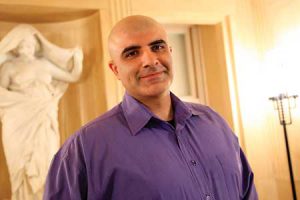
By Neale McDevitt
McGill loves brains – and has loved brains since the University first opened its doors 190 years ago. So it should come as no surprise that the Integrated Program in Neuroscience (IPN) is the largest graduate program in the Faculty of Medicine and the largest neuroscience program for graduate students in Canada.
“We are very interdisciplinary and very interdepartmental,” said Joe Makkerh, IPN’s Program Administrator. “We have more than 20 research institutes or departments on board, along with some 300 students and 180 professors.”
Neuroscience training within the IPN spans the full spectrum of research fields, from cellular and molecular neuroscience to behavioral and cognitive neuroscience.
It is precisely this breadth that served as the catalyst for the creation of IPN’s annual retreat. Now in its third year, the retreat, mandatory for all graduate students in the program, is open to anyone doing neuroscience at McGill.
Makkerh says that the beauty of the retreat, which takes place Sept. 20-21 at the Centre Mont-Royal, is that it offers participants the chance to get out of their own research bubble and see what other neuroscientists are doing. “We have lectures on more traditional topics like the neurobiology of disease that will look at the molecular nitty gritty of diseases like Parkinson’s.” said Makkerh. “But we also have sessions that are not that traditional, such as one on neuro-philosophy that looks at people suffering from delusions – people who don’t believe that the person in the mirror is really them or that the moon landings never happened.”
More than just giving researchers the opportunity to hear about the incredible variety of neuroscience being done at McGill, retreat organizers hope they can bring them together on a professional level as well. The Rapid Round Robin session will have participants meet each other one-on-one for 10 minutes to discuss their research interests before moving on to the next person. “It’s scientific speed dating,” said Makkerh. “It is a great way to meet people with similar or complimentary interests and it has lead to some interesting collaborations.
“For example, people from the biology department who do microscopy make some great contacts every year. Last year they did a piggyback event, an imaging workshop, and that was very successful.”
One of the highlights of the retreat will be the first Colman-Sievers Innovation in Neuroscience Talks and Ann and Richard Sievers Award Presentations. “Last year David Colman [former Director of the Montreal Neurological Institute and Hospital who passed away earlier this year] gave an amazing inspirational talk about the importance of innovative research. He always encouraged students to think outside the box,” said Makkerh. “Then earlier this year, we were contacted by Marc Sievers who said he had $25,000 to give to an IPN student if we could prepare a competition for someone who is about to finish their PhD who has found something pretty cool but didn’t have the funds to pursue it beyond their PhD.”
The winner of the award and the two runners up will be present their innovative research at the retreat in what Makkerh calls “layman’s terms, or at least in neuroscientist layman’s terms.”
The IPN Retreat; Sept. 20-21; Centre Mont-Royal; free admission; for more information go to www.mcgill.ca/ipn/
